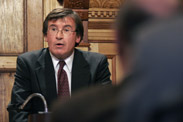Anti-American obsession: Quebec vs. the U.S.
Anti-American obsession: Quebec vs. the U.S. McGill University
User Tools (skip):
Anti-American obsession: Quebec vs. the U.S.
Obsession is usually not in the academic vocabulary of political scientists like David Haglund, Seagram Visiting Chair in Canadian Studies and professor at Queen's University who examined the question: Does Quebec Have an "Anti-American Obsession"? on April 11, 2005. The Ninth Annual Seagram Lecture was co-sponsored by McGill's Institute for the Study of Canada and the Université de Montreal's Chair in American Political and Economic Studies.

Seagram Visiting Chair in Canadian Studies, and professor at Queen’s University, David Haglund
Owen Egan
Haglund's lecture traced the origins of a surprising "sea-change" in the attitude of Quebeckers towards America to the period after the 9/11 attacks. He explained that prior to this event, the Québécois were considered the most pro-American of Canadians. He cited an example during the 1980's debate on NAFTA in which so many Quebeckers favored continental economic integration that many English Canadians worried aloud Quebec was betraying the rest of the country.
The "sea-change" in Quebec's attitude towards America was displayed in a 2004 La Presse international survey of ten countries asking which U.S. Presidential candidate was preferred and what the respondents thought of Americans. English Canadians' approval of Americans was 79 percent. Quebeckers' approval ratings were only 52 percent.
Haglund pointed out the linguistic gulf between English and French Canada was particularly visible in demonstrations against the 2003 invasion of Iraq. The size of anti-war demonstrations in Montreal numbered 150,000-250,000 compared to between 10,000-30,000 in Toronto. After the fall of Baghdad, polls showed two-thirds of the public outside Quebec felt it was a mistake not joining forces with the U.S. and Britain. In Quebec, there was near-unanimity against the war. Only one Quebecker in ten was prepared to accept the possibility of merit in forcibly unseating Saddam Hussein.
Where did this emerging anti-Americanism come from? Haglund identifies two sources: the first is what he calls "The French Connection" and the second is Quebec's historical antimilitarist tradition.
According to Haglund, Quebec's chattering classes take their intellectual cues from France. He cites two influential books that appeared in 2002. The first is Jean-Francois Revel's L'Obsession anti-américaine: Son fonctionnement, ses causes, ses inconséquences and Phillipe Roger's L'ennemi américain: Généalogie de l'antiaméricanisme français. Quebec political scientist, Louis Belanger, is quoted as saying "Because of the language barrier, Quebeckers are less exposed to U.S. media, and much more exposed to French coverage and opinions on international issues."
The second major factor in Quebec's anti-Americanism stems from an anti-militarism which began in the late nineteenth century. During the First World War, for example, of the 500,000 volunteers in the Canadian Expeditionary Force, only 13,000 were French Canadians. Haglund explained that overseas military expeditions involving Canada are guaranteed to be divisive on the national unity front. America's post 9/11 flexing of military muscle is a major factor in Quebeckers' new attitude that "they cannot trust the United States" and that "the U.S. is a force for evil in the world."
In conclusion, Haglund speculated on the national unity implications of the growing gulf in opinion about the United States between French and English Canada. He posed questions about how this divide would affect Canadian foreign policy and in response to a question from the audience, wondered aloud about how a separate Quebec might deal with the United States in which there might be economic consequences for its anti-Americanism without the protection of confederation.
